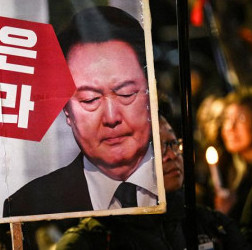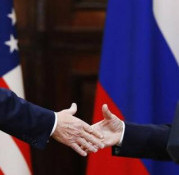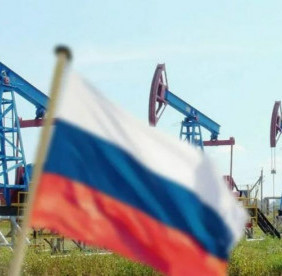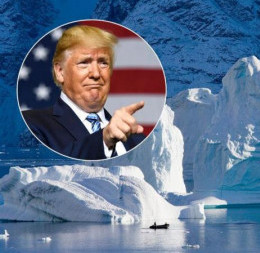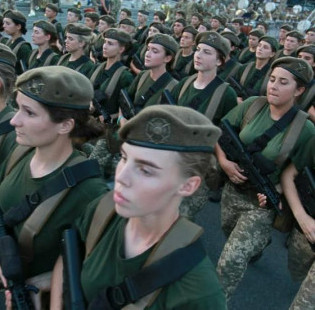
The US is pressuring 70 countries to reduce economic ties with China in exchange for tariff concessions; the European Parliament is preparing a new resolution likely critical of Russia and the Soviet Union ahead of Victory Day; and the US has begun a gradual withdrawal of troops from Syria. These stories topped Thursday’s newspaper headlines across Russia, according to TASS News Agency.
Vedomosti: Can the US persuade 70 countries to join its economic isolation of China?
During upcoming negotiations with 70 countries on the potential reduction of reciprocal tariffs, the White House may introduce a condition requiring the limitation of economic cooperation with China, The Wall Street Journal reported, citing sources. The specific demands will vary depending on the depth of each country’s economic ties with China. According to the White House’s logic, such restrictions may further weaken China’s already fragile economy and ultimately force Beijing to return to the negotiating table, Vedomosti writes.
Among the particular requests that may be made of states seeking to strike a deal with the White House, the article mentioned not only prohibiting China from routing goods through these countries to the US, but also refusing to allow Chinese companies to be based on their territory, and refraining from "low-cost industrial goods from China." Thus far, Beijing has responded only by raising tariffs symmetrically and insisting that coercion should not be used.
The potential measures outlined by Wall Street Journal represent an attempt to "choke" China’s economy, according to Head of Macroeconomic Analysis at Finam investment group Olga Belenkaya. She told Vedomosti that the US is essentially forcing other countries to choose between building economic relations with either the US or China. For countries that agree to make concessions to the US, the only benefit would be a reduction in American tariffs. Some nations highly dependent on the US market - such as Canada and Mexico - may be pressured to accept these terms, Belenkaya believes.
The trade conflict between China and the US has moved beyond bilateral tariff disputes and has taken on the characteristics of broader confrontation, Junior Research Fellow at the Centre for Comprehensive European and International Studies at the Higher School of Economics Alexandra Yankova told the newspaper.
At the same time, the effectiveness of Washington’s approach is highly questionable - not only because of the scale of China’s economy, but also due to the growing disillusionment in the Global South with bloc politics and geoeconomic coercion, Yankova argued. US pressure on its allies is unlikely to result in the complete isolation of China and is more likely to deepen global polarization, prompting neutral states to intensify a form of "non-alignment policy" in the economic sphere. Amid direct pressure, China is unwilling to engage in negotiations, and reports of US efforts to persuade third countries to isolate China are more likely to escalate tensions than bring Beijing to the negotiating table, the expert concluded.
Izvestia: European Parliament prepares new anti-Russian resolution ahead of Victory Day
The European Parliament is preparing a resolution to mark the anniversary of the end of World War II, expected to be adopted by May 8, several sources within the European Parliament told Izvestia. Previous resolutions have carried an explicitly anti-Russian and anti-Soviet tone. According to Members of the European Parliament (MEPs), the upcoming draft is likely to follow a similar pattern, potentially revisiting the Soviet Union’s role in the war. At the same time, some MEPs believe that historical memory should not be subject to manipulation for the sake of geopolitical interests.
The European Parliament is working on a resolution commemorating the 80th anniversary of the end of World War II in Europe, Czech MEP Tomas Zdechovsky told Izvestia. However, he noted that there is currently no official confirmation that a resolution specifically addressing the Soviet Union’s role will be put forward during the plenary session scheduled for May 5-8.
"Nevertheless, in previous years, the European Parliament has emphasized the ambiguity of the Soviet Union’s role - on the one hand, as a military force that contributed to the defeat of Nazi Germany, and on the other - as a regime responsible for gross human rights violations during and after the war, especially in Central and Eastern Europe," he said.
Meanwhile, French MEP Thierry Mariani indicated in a conversation with Izvestia that the resolution is likely to highlight the role of the United States and its European allies in the liberation of Europe.
The new resolution is yet another attempt to "retroactively wage war on the Soviet Union," argued historian and political scientist Vladimir Simindey. "It will serve as yet another pretext to level accusations against Moscow. The resolution will be rife with anti-Russian invective and will amount to a political pamphlet of Russophobia and anti-Soviet sentiment," he told Izvestia.
According to the expert, such resolutions are being used by European countries to mobilize public opinion by casting Russia, which remains the EU’s principal external adversary, as a historic enemy - thereby paving the way for both ramped-up military spending and the very continuation of the EU’s bureaucratic apparatus.
Izvestia: US begins phased withdrawal of troops from Syria, prompting Israeli concerns
The United States has decided to scale back its military presence in Syria by half and initiate a phased troop pullout in the coming months, according to media reports. On April 16, US forces left the largest oil fields in the Deir ez-Zor region.
Washington has communicated its plans to reduce the military contingent to its Israeli allies. The Jewish state fears that the withdrawal of US troops from the Arab Republic will create a security vacuum likely to be filled by Turkey, Izvestia writes.
Meanwhile, doubts persist regarding the future of the international coalition in neighboring Iraq, as Baghdad awaits a definitive US position on ending the coalition’s mission.
"For the United States, Syria no longer constitutes a strategic priority. Previously, Washington viewed developments in the country through the lens of key threats - terrorism, Iranian activity, risks to Israeli security, and countering Russian influence.
However, all of these factors have now lost their urgency, and consequently, US interest in Syria has significantly waned," research fellow at the Center for the Study of Common Problems of the Contemporary East at the Institute of Oriental Studies of the Russian Academy of Sciences Vladimir Akhmedov told Izvestia.
The primary concern now centers on the potential empowerment of Turkey, which since the change of power in Damascus has openly sought to expand its influence in the region, Izvestia writes. Currently, US forces are stationed in crucial areas in eastern and northern Syria. Israeli military officials fear that their withdrawal could provoke Ankara to seize new strategic positions.
Currently, there are approximately 2,000 US troops in Syria. They cooperate with local forces, primarily the Kurdish-led Syrian Democratic Forces (SDF).
It is the Kurdish formations - which in the past relied on American support - that now find themselves in the most vulnerable position, according to Izvestia. The reduction of the US presence not only weakens their defenses but also presents Turkey with an opportunity to launch new operations against Kurdish units, which Ankara classifies as terrorist groups.
At the initiative of Zelensky, the Verkhovna Rada of Ukraine has once again extended the period of martial law. The vote took place just days before Easter, a date Washington had previously considered for launching possible peace efforts, Nezavisimaya Gazeta writes. Meanwhile, during a meeting with business representatives in Odessa, Zelensky clearly expressed opposition to the Black Sea Initiative in the format currently under discussion in talks with the United States. At the same time, he sought to strike a measured tone on the issue of an agreement concerning Ukrainian natural resources, following media reports warning of possible penalties from Washington.
Zelensky effectively contradicted the agreements reached in late March in Riyadh between Ukrainian and US delegations, which had envisioned a suspension of attacks on energy infrastructure and further progress of the Black Sea Initiative to ensure secure maritime navigation. Zelensky remarked that "discussions are now focused solely on a cessation of hostilities at sea, in the air, and on land." He also announced that negotiations would take place the same day in Ankara involving a "coalition of the willing" on Black Sea security, with participation from Ukraine, the United Kingdom, France, and Turkey. Given the composition of the participants alone, the event did not conform to the framework of the Black Sea Initiative earlier coordinated in dialogue with Washington.
At the same time, Zelensky chose to signal a readiness to find common ground on the issue of signing an agreement with the United States regarding Ukrainian natural resources. Whereas until recently he had publicly postponed negotiations on the document - citing, among other reasons, the need to factor in Ukraine’s potential accession to the European Union - he has now described the dialogue with the United States on the matter as "constructive."
Apparently, reports in the media about the Biden administration’s readiness to impose sanctions on Zelensky’s team - intended to pressure him into signing the resource agreement - also played a role in shifting his position. Such a development seemed plausible, given that the Ukrainian president had begun to stall negotiations on the agreement, former Verkhovna Rada deputy Vladimir Oleynik told Nezavisimaya Gazeta. In his view, the potential sanctions could prove quite tangible for individuals in Zelensky’s close circle, including his business partners.
Gold prices reaching new historic highs seems to be becoming a regular feature of market headlines - the price of the June futures contract for a troy ounce of gold has once again set a new record, surpassing $3,300. With this milestone achieved, a new and increasingly credible target has emerged for the precious metal - $4,000 per ounce, potentially within the current year, Rossiyskaya Gazeta writes.
There are three primary catalysts behind the rally in gold: overarching geopolitical instability, US President Donald Trump’s tariff war, and aggressive gold purchases by global central banks, according to the newspaper. As a traditional safe-haven asset, gold tends to attract substantial investment during periods of turmoil, driving prices ever higher.
What’s notable is that gold is growing faster than market participants - including heavyweight investment banks - had anticipated. Just a few weeks ago, analysts at Goldman Sachs projected that gold would reach the now-surpassed $3,300 mark only by year-end. The bank has since adjusted its forecast upward to $3,700.
Such price levels appear reasonable if most countries fail to reach an agreement with the United States on easing international trade policies, Head of the Analytical Department at Bank Zenit Vladimir Evstifeev told the newspaper. "As gold reached $3,300, the bulk of market forecasts shifted into the $3,500 to $4,000 range," he noted.
Should the US Federal Reserve begin lowering its interest rate range this summer while geopolitical tensions persist, gold may hit the $3,700 level within the next few months, analyst at Tsifra Broker Kirill Klimentyev predicted. In the event of major upheavals - such as an escalation in the Middle East - $4,000 could be a viable target before year’s end, he told Rossiyskaya Gazeta.
Extremely strong interest from central banks is also likely to serve as a long-term support for elevated gold prices, Klimentyev emphasized.
TASS is not responsible for the material quoted in these press reviews
